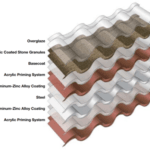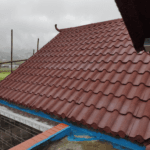In the construction industry, roofing tiles are an essential component of buildings, playing a crucial role not only in protecting structures but also in enhancing their aesthetic appeal and energy efficiency. With the advancement of construction technology and continuous innovation in materials, various types of roofing tiles have emerged on the market. This article will introduce several common types of roofing tiles and explain why stone-coated metal tiles stand out among the options and are highly recommended as a roofing material.
I. Common Types of Roofing Tiles
1.Ceramic Tiles

Ceramic tiles are one of the most traditional roofing materials, typically made from clay fired at high temperatures. They are known for their fire resistance, corrosion resistance, rich colors, and long lifespan, making them a popular choice for residential, historical, and traditional-style buildings. However, ceramic tiles are relatively heavy, requiring strong roof structures, and their installation can be complex.
2.Concrete Tiles

Concrete tiles are primarily made from cement and sand, molded into shape and colored. They are characterized by their relatively low cost, high strength, and durability. However, concrete tiles often have a more uniform color and texture, and they may experience fading and cracking over time.
3.Asphalt Shingles

Asphalt shingles are composed of a fiberglass mat base coated with asphalt and covered with colored granules. These shingles are lightweight, easy to install, waterproof, and provide some insulation. They are commonly used in villas and modern buildings but may be prone to damage under extreme weather conditions.
4.Metal Tiles

Metal tiles are made from materials such as steel, aluminum, or copper. They are lightweight, durable, and easy to install, making them widely used in industrial and commercial buildings. However, metal tiles have relatively poor insulation properties, as they can conduct heat in both hot and cold conditions.

Stone-coated metal tiles are an upgraded version of metal tiles, using an aluminum-zinc alloy steel plate as the base material and covered with natural stone granules and an acrylic resin coating. Combining the strength of metal tiles with the aesthetic appeal of natural stone, stone-coated metal tiles have become a popular choice in recent years.
II. Why Recommend Stone-Coated Metal Tiles?
1.Outstanding Weather Resistance and Corrosion Resistance
The base material of stone-coated metal tiles, aluminum-zinc alloy steel, provides excellent corrosion resistance, effectively withstanding harsh environments such as humidity, acid rain, and salt spray. The natural stone granules and acrylic resin coating on the surface further enhance the tiles’ weather resistance, ensuring stable performance in various climatic conditions.
2.Variety of Appearance Options
The surface of stone-coated metal tiles is covered with natural stone granules, offering various colors and textures to meet different architectural design needs. Whether for traditional-style villas or modern commercial buildings, stone-coated metal tiles provide the ideal aesthetic effect.
3.Excellent Insulation and Noise Reduction
The multi-layer structure of stone-coated metal tiles enhances their insulation properties while effectively reducing noise. Especially in summer, these tiles can significantly reduce the amount of heat absorbed by the roof, lowering the temperature inside the building and contributing to energy savings. Additionally, the stone granule layer has some sound-absorbing properties, reducing external noise interference.
4.Lightweight and Easy to Install
Compared to traditional ceramic and concrete tiles, stone-coated metal tiles are lighter, imposing lower load requirements on the roof structure, making them suitable for both new constructions and renovations. The installation process for stone-coated metal tiles is also relatively simple, allowing for faster construction and saving considerable time and labor costs.
5.Long Lifespan and Low Maintenance Costs
Due to their superior materials and craftsmanship, stone-coated metal tiles typically have a lifespan of over 50 years. During this period, they require almost no additional maintenance, significantly reducing long-term maintenance costs. For building projects that aim for a one-time investment with long-term benefits, stone-coated metal tiles are undoubtedly a wise choice.
Conclusion
When choosing roofing tiles, it is essential to consider not only the architectural style and budget but also the durability, performance, and aesthetics of the material. Stone-coated metal tiles, with their outstanding performance and diverse appearance options, are becoming the recommended choice for more and more architects and homeowners. Whether in new construction projects or roof renovations, stone-coated metal tiles provide long-lasting protection and an elegant appearance for buildings.



